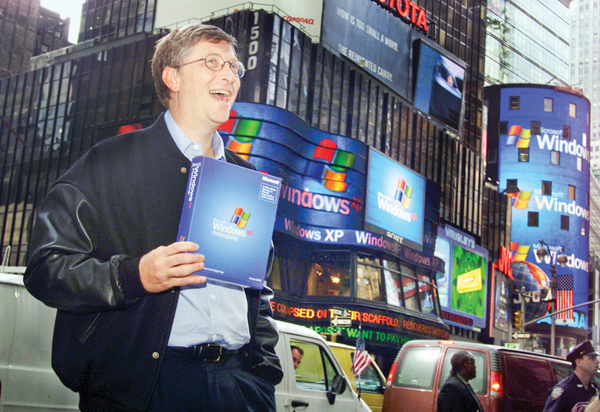End of Windows XP support spells trouble


Microsoft chairman Bill Gates stands in New York’s Times Square to promote the new Windows XP operating system. Microsoft will end support today for its still popular Windows XP. With an estimated 30 percent of businesses and consumers still using the 12-year-old operating system, the move could put everything from the data of major financial institutions to the identities of everyday people in danger if they don’t find a way to upgrade soon.
Associated Press
NEW YORK
Microsoft will end support for the persistently popular Windows XP today, and the move could put everything from the operations of heavy industry to the identities of everyday people in danger.
An estimated 30 percent of computers being used by businesses and consumers around the world still are running the 12-year-old operating system.
“What once was considered low-hanging fruit by hackers now has a big neon bull’s-eye on it,” says Patrick Thomas, a security consultant at the San Jose, Calif.-based firm Neohapsis.
Microsoft has released a handful of Windows operating systems since 2001, but XP’s popularity and the durability of the computers it was installed on kept it around longer than expected. Analysts say that if a PC is more than 5 years old, chances are it’s running XP.
Though users still can run XP after today, Microsoft says it no longer will provide security updates, issue fixes to nonsecurity-related problems or offer online technical-content updates. The company is discontinuing XP to focus on maintaining its newer operating systems, the core programs that run personal computers.
The Redmond, Wash.-based company says it will provide anti-malware-related updates through July 14, 2015, but warns that the tweaks could be of limited help on an outdated operating system.
Most industry experts say they recognize that the time for Microsoft to end support for such a dated system has come, but the move poses both security and operational risks for the remaining users. In addition to home computers, XP is used to run everything from water-treatment facilities and power plants to small businesses such as doctor’s offices.
Thomas says XP appealed to a wide variety of people and businesses that saw it as a reliable workhorse, and many chose to stick with it instead of upgrading to Windows Vista or Windows 7 or 8.
Thomas notes that companies generally resist change because they don’t like risk. As a result, businesses most likely to still be using XP include banks and financial-services companies, along with health care providers. He also pointed to schools from the university level down, saying that they often don’t have enough money to fund equipment upgrades.
Marcin Kleczynski, CEO of Malwarebytes, says that without patches to fix bugs in the software, XP PCs will be prone to freezing up and crashing, while the absence of updated security-related protections make the computers susceptible to hackers.
 43
43
